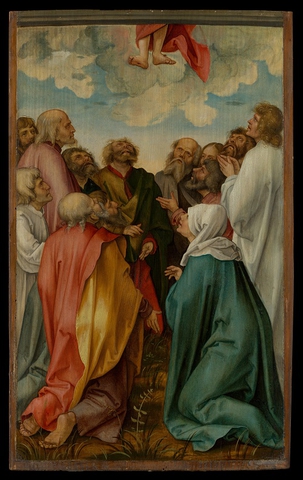
Reflection for Easter 7
23 May 2020 • zzz_Archive
Easter 7
Collect
Risen, ascended Lord,
as we rejoice at your triumph,
fill your Church on earth with power and compassion,
that all who are estranged by sin
may find forgiveness and know your peace,
to the glory of God the Father. Amen.
Readings: Acts 1:6-14 and John 17:1-11
Last Thursday was Ascension Day, when we remember the end of Jesus’ appearances to his disciples after his death. We celebrate Ascension Day as something definite and positive happening, just as the painter Hans Süss von Kulmbach imagined it happening in 1513 — Jesus powering up into the clouds, so that all we can see of him is his feet!
But I wonder whether, for Jesus’ disciples, it was rather a negative event. It was the end of something, the disappearance of something. Jesus’s friends, with whom he had been so close, stopped experiencing his closeness, his presence.
It must have been very similar to how we can experience a bereavement ourselves — for some days or weeks after the death of somebody really close to us, we almost feel their presence still, feel we need to lay their place at the table, tidy their clothes in the cupboard, save things up to tell them. But at the end of that time — and it may be short or much longer — we realise that we haven’t felt them close for a while — even that we haven’t consciously thought about them for a bit. It’s a natural part of our grieving.
And, for the disciples, it left them in an ‘in between’ place. The story in Acts has Jesus promising them that the Holy Spirit would come upon them — but what was that? And when would it happen? We know the rest of the story, and we will be celebrating Pentecost and the coming of the Holy Spirit next Sunday — but they didn’t. It must have been a strange time for them. An ‘in between’ place, where the old familiar things were past, and the future was unknown, strange, perhaps frightening. They were poised on a threshold.
At some stage in our lives, we will have been in the same situation. Leaving our mothers and starting school for the first time. Moving from school to college, or to our first job. Not necessarily bad things to be encountered, but still that element of uncertainty — leaving the old, comfortable normality, and not quite sure what the future holds, what will be expected of us, whether we will be able to cope, and meet the expectations of others. Getting married — so exciting, so new — but still some anxieties — is it the right thing? Are we ready for it? And parenthood: all those thresholds which we have experienced, and where we have stood teetering on the brink. And, of course, bereavement, when we know that the old familiar relationship has gone for ever, and life will never be the same again, but we don’t know what this new life will be like.
Of course we are all experiencing that same thing at this very moment, with the epidemic. We are all in that ‘in between’ place, where our old lives, with all our habits and pastimes, jobs and holidays have gone; and we don’t know what life will be like in the future.
But people have been there before us, with all their different thresholds, all their different ‘in between’ places. And I don’t think the answer to how to deal with it can be expressed better than in the words of Minnie Louise Haskins, in her poem:
And I said to the man who stood at the gate of the year:
“Give me a light that I may tread safely into the unknown.”
And he replied:
“Go out into the darkness and put your hand into the Hand of God.
That shall be to you better than light and safer than a known way.”
So I went forth, and finding the Hand of God, trod gladly into the night.
And He led me towards the hills and the breaking of day in the lone East.